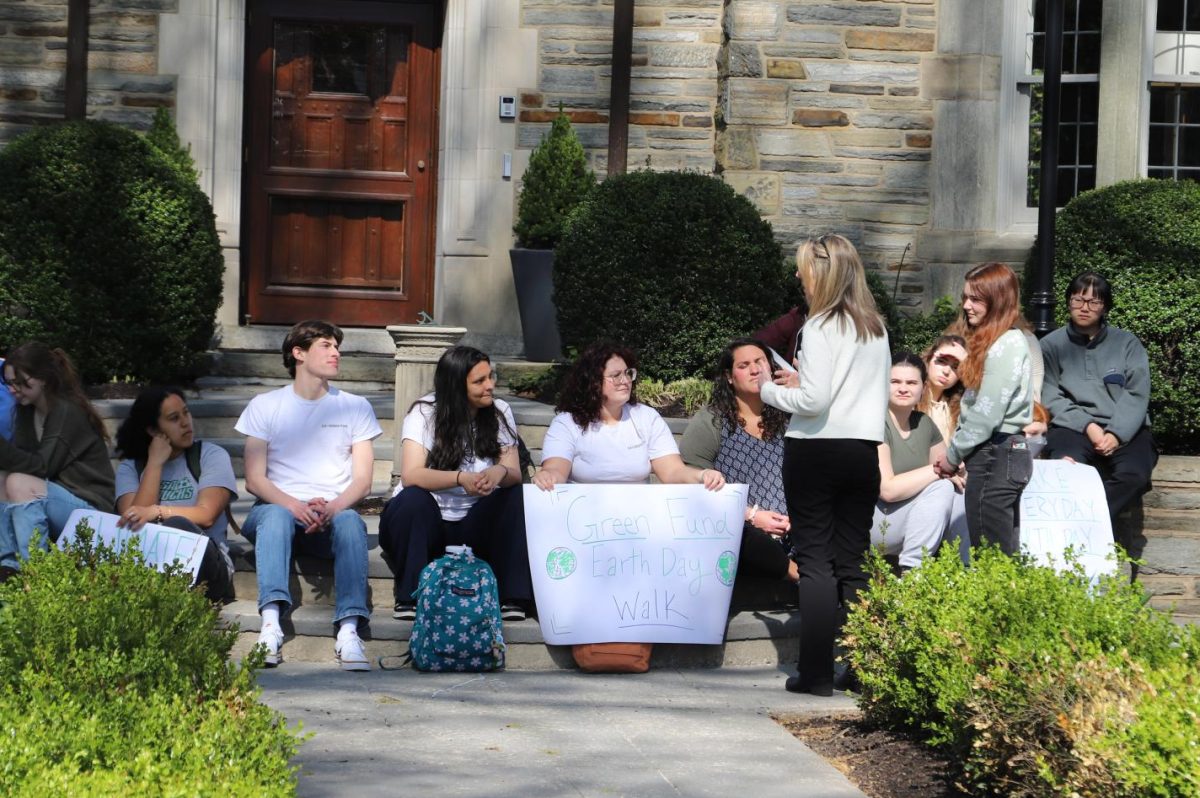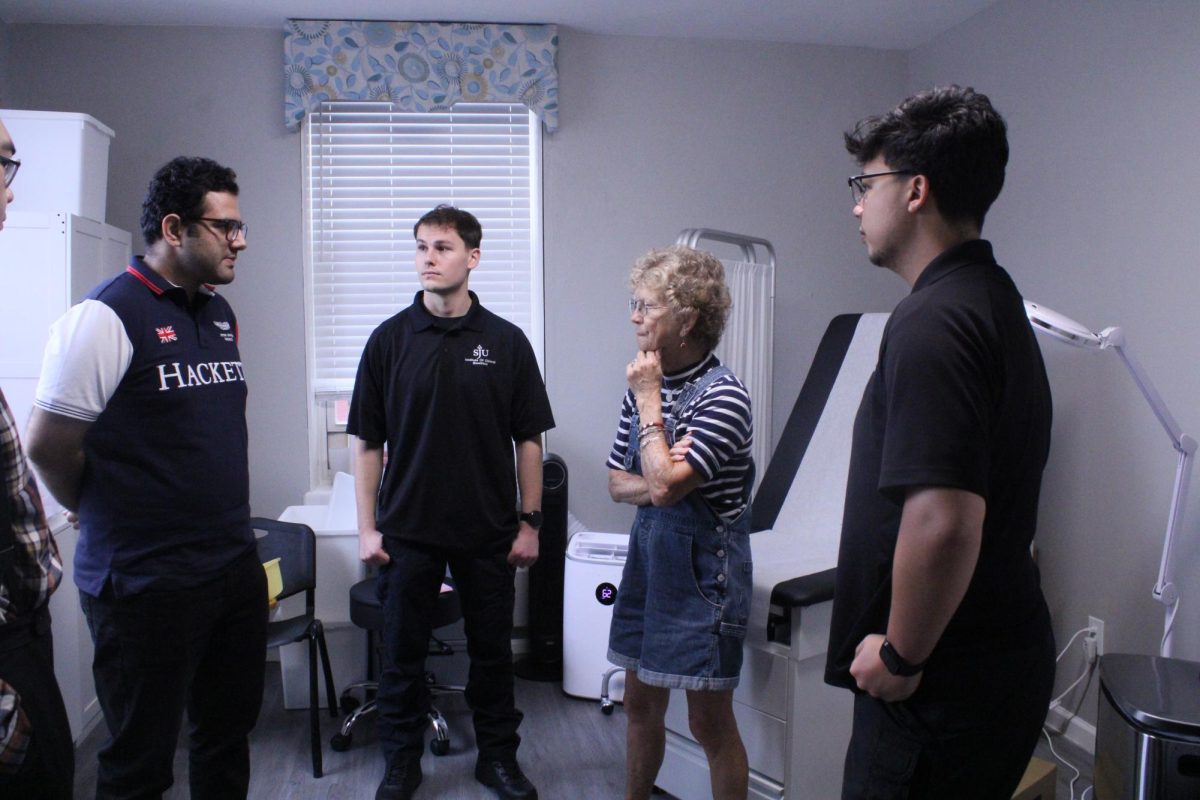Over the summer, St. Joe’s announced its commitment to becoming designated as a Laudato Si’ University by the Vatican. The university will partake in a seven-year plan, named the “President’s Laudato Si’ Initiative on Sustainability and Stewardship,” to combat causes of climate change and become a more sustainable institution.
The initiative is centered around three main principles: environmental stewardship, social justice stewardship and cura personalis stewardship, according to the July 17 announcement from University President Cheryl McConnell, Ph.D. These values exemplify the relationship between people and the environment, recognizing the importance of sustainability efforts for humanity as a whole.
“At Saint Joseph’s, our mission calls us to care deeply for the world and all who inhabit it,” McConnell wrote in an email to The Hawk. “This initiative isn’t just about sustainability. It’s about forming compassionate, informed citizens who will lead with purpose and respect for our common home.”
The initiative is based on Pope Francis’ 2015 encyclical “Laudato Si’: On Care for Our Common Home,” which implores all people to protect the Earth and work to combat climate change.
The Vatican’s Laudato Si’ Action Platform helps individuals and institutions make a plan to fulfill Francis’ call to action. It states seven goals for participating parties to work towards: response to the cry of the earth, response to the cry of the poor, ecological economics, adoption of sustainable lifestyles, ecological education, ecological spirituality and community resilience and empowerment.
St. Joe’s path toward becoming a Laudato Si’ University is a long one and involves people throughout the entire university community. Alumni Brian Dooner ’83 and Marlene Dooner ’83 are funding the initiative. Students, faculty and staff make up the sustainability guiding coalition, the group that will lead the initiative over the next seven years.
The coalition is currently working on the first phase of the initiative: a materiality assessment, which examines where the university is doing well in terms of sustainability and where it needs to improve, said Clint Springer, Ph.D., associate professor of biology, director of the Institute for Environmental Stewardship and director of the Barnes Arboretum who is a member of the coalition. Springer said he has been studying global climate change for over 20 years.
The materiality assessment, which examines all areas of the university from community outreach to facilities management, is expected to be completed within the next few weeks, Springer said.
Nicole Bowen ’26, an environmental science major and a member of SJU Green Fund, has contributed to the materiality assessment through her 2024 Summer Scholars project, which involved calculating Hawk Hill’s carbon footprint. Bowen said the university’s carbon footprint was comparable to the carbon footprint of universities of a similar size, with a similar number of students and a similar endowment per student as St. Joe’s.
“But just because it wasn’t over the top of comparable universities doesn’t mean that we shouldn’t decrease our carbon footprint heavily,” Bowen added. “The carbon that’s in the atmosphere now is from years and decades ago, so we can’t keep doing this.”
The next step of the initiative will be selecting which of the Laudato Si’ Action Platform’s goals to focus on and drafting a sustainability plan to send to the coalition’s consultants, Springer said. In the spring of 2025, this plan will be presented to the St. Joe’s community for feedback and reflection, with the hope that it will be revised and implemented in the fall of 2025.
The creation of the university’s Laudato Si’ initiative is a result of various factors over multiple years. One major element that led the university to increase its sustainability efforts was when the Society of Jesus released its four Universal Apostolic Preferences in 2019, one of which is “Caring for Our Common Home,” Springer said.
The release of the Preferences also had an impact on individual organizations at St. Joe’s, like Campus Ministry, said Tom Sheibley, director of campus ministry.
“When the Universe Apostolic Preferences of the Jesuits came out … that did certainly make us ask ourselves, ‘How are we doing and how can we do better?’ And that has to be an ongoing conversation,” Sheibley said.
Daniel Joyce ’88, S.J., vice president of mission and ministry, said it is important for Catholic and Jesuit institutions to uphold this care for the planet.
“It’s a moral obligation for us to try to make sure our community lives with integrity, and in this case, integrity with all of nature, all life forms, and have a unity or harmony with the planet,” Joyce said.
The initiative also comes after years of advocacy from across the St. Joe’s community, Springer said. He and other faculty and staff — including McConnell, when she was provost and senior vice president of academic affairs — have been pushing for an initiative like this for a while, but they “lacked deep presidential commitment,” he said.
A number of student-led actions in spring 2024 were a major motivator for the university, Springer said.
“We were really able to accomplish and get to where we are today because the students spoke up, and the student voice was heard very clearly and very loudly,” Springer said.
University Student Senate and Green Fund, in particular, advocated for better sustainability efforts last semester.
Student Senate passed “A Resolution in Support of a University Commitment to Environmental Sustainability,” presented by Green Fund, in April. The resolution called upon the university to create a committee and an office of “Creation Care” to make and track progress towards sustainability goals.
“[We were] asking the university to take action on, what are we doing in regards to sustainability and seeing how can we make progress on this? I think the response from the university has been great since then,” said Milton O’Brien ’25, Student Senate president and a member of the sustainability guiding coalition.
Additionally, Green Fund organized an Earth Day walk and sit-in outside of Regis Hall, the Office of the President, April 22 to show that sustainability and climate justice are important to students.
Alexandria Marro ’25, president of Green Fund, said sustainability has been the “missing piece” of the university’s effort to carry out Jesuit values.
“You can’t care for the whole person unless you start caring for your environment, because that’s part of your personhood, and I started to consider the Earth as having a personhood,” Marro said. “It’s important that the university lives up to all the things that they claim that they’re good at.”
Springer said the Laudato Si’ Initiative is crucial to St. Joe’s mission as a university, and allows the university to address climate change, which is “the largest scale social justice issue that the world has ever faced.”
“Our role as a university should be to prepare people to go out and ask those harder questions, to solve society’s problems, to help work towards a solution that is inclusive of all the cultures and differences that exist in society,” Springer said. “This is exactly what we should be doing. It is mission-critical to us, in a way … We need to prepare our citizens and our leaders of the future for what’s coming.”



















































